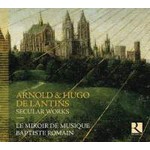
Secular Works
 $36.00
Out of Stock
$36.00
Out of Stock2-4 weeks add to cart
ARNOLD & HUGO DE LANTINS
Secular Works
Le Miroir De Musique, Baptiste Romain
[ Ricercar / CD ]
Release Date: Friday 22 April 2016
This item is currently out of stock. We expect to be able to supply it to you within 2 - 4 weeks from when you place your order.
The composers Arnold and Hugo de Lantins were natives of the diocese of Liège, but it was in Italy, principally in Pesaro and Venice that their presence is confirmed between the years of 1420 and 1430. As with the works of Johannes Ciconia, a fellow native of Liège whose time in Italy had preceded theirs, their secular and sacred compositions are preserved in manuscripts copied in Italy. Closely rubbing shoulders with their illustrious contemporary Guillaume Dufay, the Lantins brothers combined archaic traits with the earliest characteristics of the Renaissance. Le Miroir de Musique presents a large selection of French and Italian chansons which enriches our view of the cultural sophistication of the Italian courts at the start of the 15th century.
An introductory note by Jérôme Lejeune
"The De Lantin brothers were both born in Liège and were active as composers during the beginning of the 15th century; RICERCAR had already devoted a CD (RIC207) to the works of one of the brothers in 2002. The Capilla Flamenca under the late Dirk Snellings presented the Missa Verbum Incarnatum by Arnold De Lantins, an important milestone in the history of music as it was possibly the first cyclic mass.
We now feature the works not only of Arnold de Lantins but also of his brother Hugo in a programme of their French and Italian chansons and canzone. The brothers were active in Italy, principally in Venice and Pesaro, where they were part of the highly refined style predominant there at the beginning of the 15th century; this was a period of transition between the archaic mediaeval style and the humanist and expressive style of the Renaissance.
The path to Italy had been laid down by another Liège-born composer several years earlier, one Johannes Ciconia; musicologist now acknowledge that Ciconia played a leading role in the creation of what would become the new musical structures of the Renaissance. Ciconia's complete works have been recorded by La Morra and Diabolus in Musica for Ricercar on RIC 316.
What, however, caused these men from Liège, soon followed by other Flemish and French composers, to travel to Italy? Although some of these were priests and would have had a practical reason for their journey, travelling to Rome to speed up their requests for the granting of ecclesiastical endowments or prebends, they would in general have been attracted by the artistic development and refinement of the Italian courts. It is interesting to note that the French language was associated with high culture at that time, possibly as a result of Petrarch's time spent in Avignon; this explains the many works of his that are set to French texts. Hugo de Lantins, however, seems to have had a rascally side, as can be seen by the acrostic (words formed by the initial letter of each line) of the rondeau Plaindre m'estuet de ma damme jolye, as it reads « putain de merde » (FILTHY WHORE); we may well wonder who the damme jolye or fair lady was that caused Hugo to insult her so."
"Le Miroir de Musique is one of a number of young groups led by an instrumentalist but combining voices as well. These ensembles make the case for instrumental participation in this repertory as compellingly as Gothic Voices did for all-vocal performance…this is one of the most satisfying 15th-century recordings I've heard in a while: specialist repertory that doesn't deserve to be." (Gramophone Award Nomination 2016 - Early Music)
"The vocal pieces are performed equally well with some arresting imitative singing in Celsa sublimatur, calm beauty in Tota pulchra es…and extraordinary fluency in the complex cross-rhythms of Je suy extent" (BBC Music)
Tracks:
Lantins, A:
Amour servir et honnourer
Amour servir et honnourer (instrumental)
Ce jour de l'an, belle je vous supply (instrumental)
Helas emy! ma dame et ma mestresse
Las, pouray je mon martire celer
Ne me vueilles belle oblier
Puis que je voy, belle, que ne m'ames
Puisque je suy cyprianes
Tota pulchra es
Tota pulchra es amica mea (instrumental)
Lantins, H:
Plaindre m'estuet
Un seul confort pour mon cuer resjoir
Per amor de costey
Mirar non posso ni conzerner (instrumental)
Je suy exent entre aman pour amour
Io sum tuo servo (instrumental)
Helas amour, que ce qu'endure
Grant ennuy m'est, tres douce simple et coye (instrumental)
Chanter ne scay ce poyse moy (instrumental)
Celsa sublimatur victoria / Sabine, presul dignissime